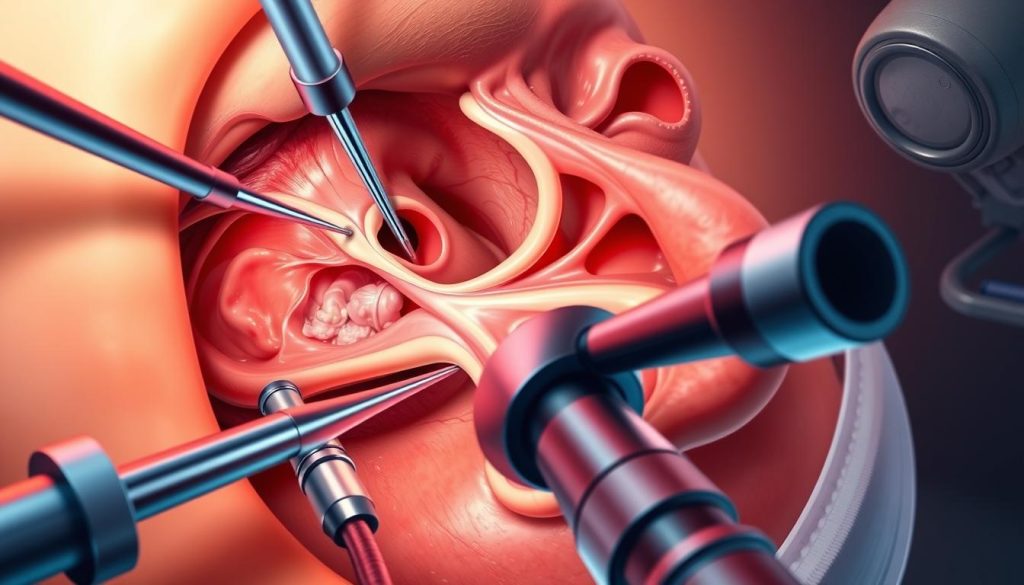Endoscopic sinus surgery has changed how we treat chronic sinus problems. It’s a less invasive way to help those with ongoing sinusitis and nasal issues. Surgeons use a small camera and special tools to reach and fix problems in the nasal passages.
This surgery, known as functional endoscopic sinus surgery, helps the sinuses drain properly again. It removes things like polyps or scar tissue that block air and lead to infections. It’s a better, less painful option than older sinus surgeries.
If you’re thinking about this surgery, you might breathe better, feel less sinus pressure, and live a better life. This guide will help you understand the procedure. It will show if it’s the right choice for your sinus health.
Understanding Chronic Sinusitis and Its Impact on Quality of Life
Chronic sinusitis is a long-term inflammation of the sinus cavities. It can greatly affect your daily life. This condition often comes from recurring sinus infections. If not treated, it can cause long-term discomfort and health problems.

Common Symptoms and Warning Signs
It’s important to know the symptoms of chronic sinusitis early. Patients often feel:
- Nasal congestion
- Facial pain or pressure
- Reduced sense of smell
- Thick nasal discharge
- Fatigue
Long-term Effects of Untreated Sinus Conditions
Untreated rhinosinusitis can cause serious problems. These may include:
- Chronic headaches
- Sleep disturbances
- Decreased productivity
- Potential spread of infection
When Medical Management Fails
Many sinusitis cases get better with medical treatment. But, some need more help. If symptoms don’t get better with medicine, surgery might be needed. Endoscopic sinus surgery is often a good choice for those who don’t get better with usual treatments.
“Chronic sinusitis can severely impact quality of life, but with proper diagnosis and treatment, relief is possible.”
What is Endoscopic Sinus Surgery
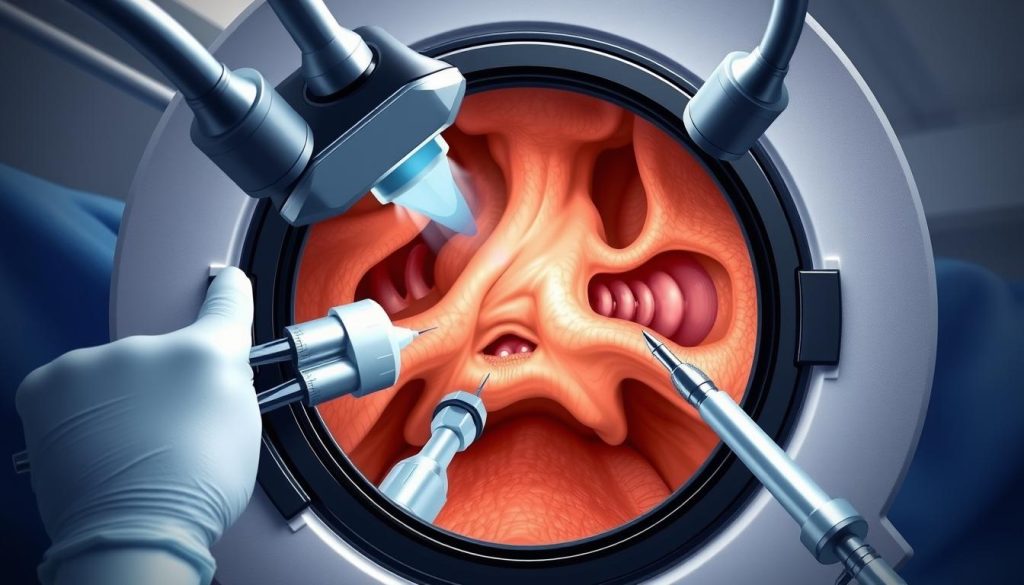
Endoscopic sinus surgery is a modern medical procedure for chronic sinus issues. It uses a thin, flexible tube with a camera to reach and treat blocked sinuses. This method is done through the nostrils, without making any cuts outside the nose.
This surgery aims to improve how sinuses drain and breathe. It’s great for treating chronic sinusitis, nasal polyps, and recurring infections. The whole process usually takes 1-3 hours and is often done without needing to stay overnight in the hospital.
During the surgery, doctors use special tools to clear out blockages and make sinus openings bigger. This endoscopic sinus surgery method lets doctors target the problem areas accurately while keeping healthy tissue safe.
“Endoscopic sinus surgery has revolutionized the treatment of chronic sinus conditions, giving patients relief with little downtime.”
The benefits of this procedure include:
- Faster recovery times
- Less post-operative pain
- Improved sinus function
- Better quality of life
| Aspect | Traditional Sinus Surgery | Endoscopic Sinus Surgery |
|---|---|---|
| Incision | External cuts | No visible incisions |
| Recovery Time | Several weeks | 1-2 weeks |
| Precision | Limited visibility | High-definition imaging |
| Scarring | Visible scars possible | No external scarring |
Modern Advances in Sinus Surgery Technology
Endoscopic sinus surgery has made big strides in recent years. New technologies have changed how surgeons do their work. This leads to better results for patients.
Image-Guided Navigation Systems
Now, surgeons use advanced navigation systems in endoscopic sinus surgery. These tools give real-time 3D images of the sinuses. This helps them move with precision and lowers the chance of problems.
The technology works like a GPS for the surgeon. It makes complex cases easier to handle.
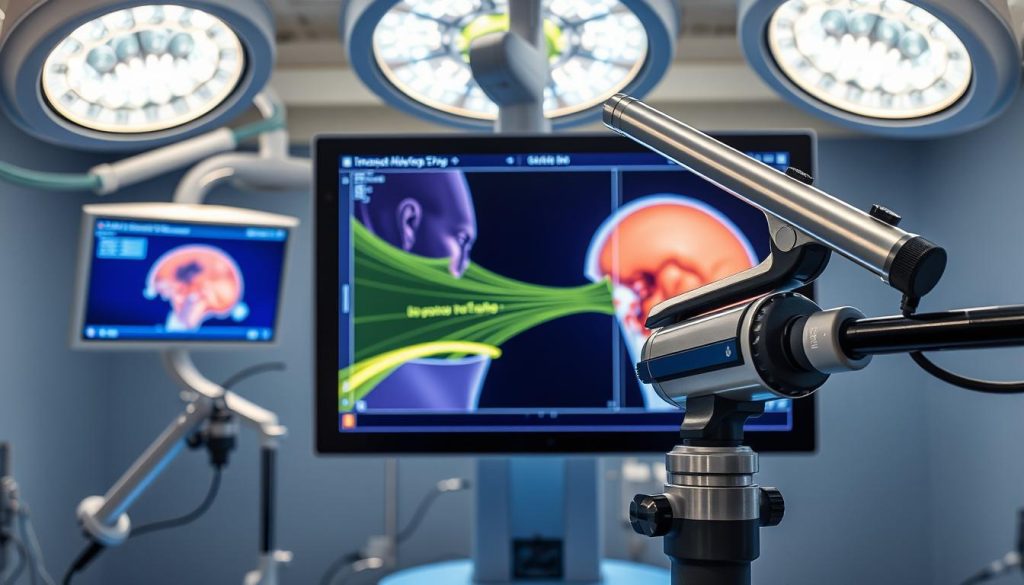
High-Definition Endoscopic Equipment
High-definition cameras and monitors have changed how we see during sinus surgery. Surgeons can now see tiny details clearly. This makes it easier to find and fix problems.
This clear view leads to more thorough surgeries. It makes endoscopic sinus surgery more effective.
Powered Surgical Instruments
New powered instruments have made sinus surgery faster and more precise. These tools help surgeons remove tissue and bone quickly and accurately. Microdebriders and drills are designed for this purpose.
These tools cut down on surgery time. They also make patients more comfortable after the procedure.
Thanks to these advances, endoscopic sinus surgery is safer and more effective. Patients recover faster and have better long-term results. This is all thanks to the precision and speed these modern tools offer.
Preparing for Your Sinus Surgery Procedure
Getting ready for endoscopic sinus surgery is a big step. Your doctor will help you through a detailed preparation process. This is to make sure you get the best results.
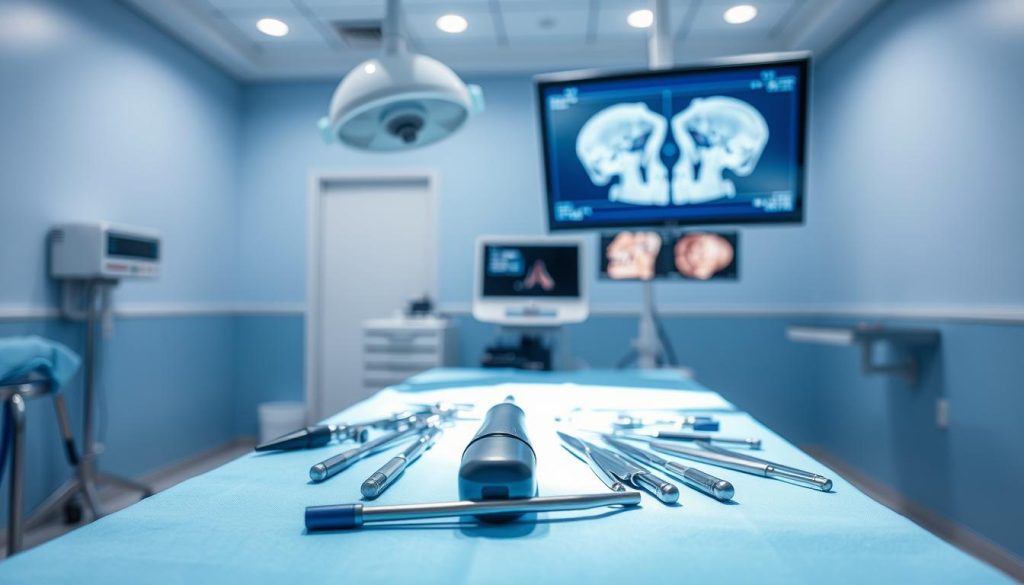
First, you’ll have a complete medical check-up. This includes blood tests, physical exams, and imaging studies. Your surgeon will look at your health and sinus condition closely.
Your surgeon will also review your medical history and current medications. This helps them understand your situation better.
You might need to change your medications before surgery. Some blood thinners and supplements can make bleeding more likely. Your doctor will tell you which ones to avoid and for how long.
- Stop smoking at least two weeks before surgery
- Avoid alcohol for at least 24 hours prior
- Arrange for someone to drive you home after the procedure
- Plan for time off work and household duties during recovery
In the days before your surgery, focus on staying healthy. Eat well, drink lots of water, and rest. If you get a cold or infection, tell your surgeon right away. It might change your surgery date.
By following these steps, you’ll be ready for a successful surgery and a smooth recovery.
Comprehensive Guide to Sinus Anatomy
Understanding sinus anatomy is key to knowing about nasal health. The complex network of passages and cavities in our nose is vital for breathing and health.
Understanding Nasal Passages
Nasal passages are the entrance to our respiratory system. They filter, warm, and humidify air as it enters our body. If they get inflamed or blocked, breathing can become hard and sinus pressure increases.
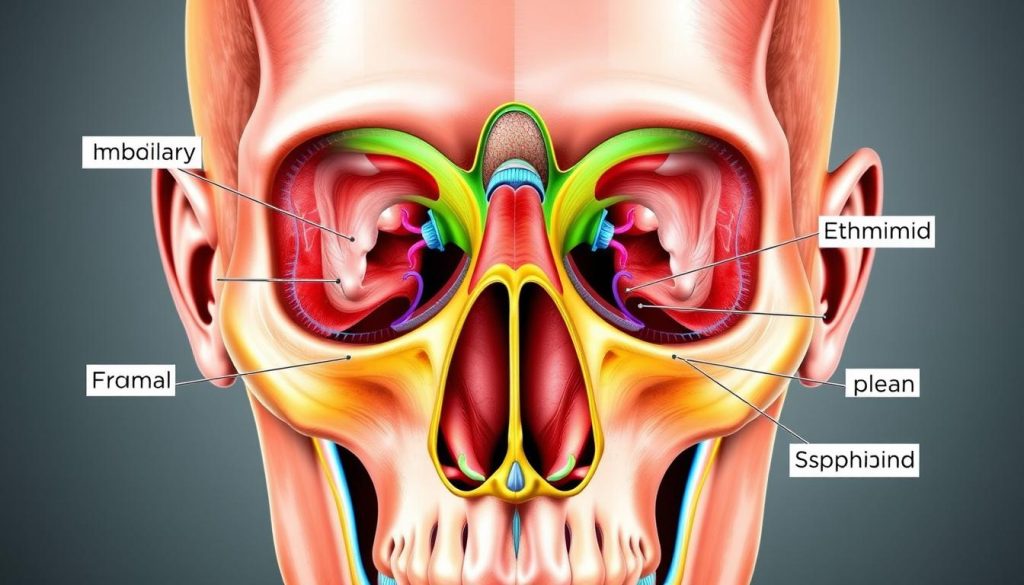
Sinus Cavities and Their Functions
Our skull has four pairs of sinus cavities. Each has a unique role:
- Maxillary sinuses: Located in the cheekbones, they help reduce skull weight
- Frontal sinuses: Situated above the eyes, these protect the brain from trauma
- Ethmoid sinuses: Found between the eyes, they contribute to our sense of smell
- Sphenoid sinuses: Deep in the skull, these drain mucus to the back of the throat
Role of Turbinates
Turbinates are bony structures inside the nose. They control airflow and moisture levels. If the turbinates get too big, they can block the nose, affecting breathing. Knowing how they work is important for dealing with sinus problems.
| Turbinate Type | Location | Primary Function |
|---|---|---|
| Inferior | Lower nasal cavity | Main airflow regulation |
| Middle | Mid-nasal cavity | Sinus drainage |
| Superior | Upper nasal cavity | Olfactory function |
Common Conditions Treated Through Endoscopic Procedures
Endoscopic sinus surgery helps with many sinus issues. It’s a small, effective way to treat chronic sinusitis, nasal polyps, and deviated septum. Let’s look at these problems and how endoscopic surgery fixes them.
Chronic sinusitis is a big problem in the US. It causes ongoing inflammation and infection. Endoscopic surgery clears blocked sinuses, helping them drain properly. This leads to better breathing and fewer infections.
Nasal polyps block airflow and cause constant congestion. Endoscopic surgery removes these polyps, fixing breathing. It brings lasting relief to many.
A deviated septum makes breathing hard and leads to sinus infections. Endoscopic septoplasty fixes this by aligning the nasal wall. It improves breathing and reduces sinus problems.
| Condition | Symptoms | Endoscopic Treatment |
|---|---|---|
| Chronic Sinusitis | Facial pain, congestion, discharge | Opening blocked sinus passages |
| Nasal Polyps | Nasal obstruction, loss of smell | Precise polyp removal |
| Deviated Septum | Difficulty breathing, nosebleeds | Septoplasty to realign nasal structure |
Endoscopic procedures target the root of sinus problems. They improve life quality for many. This advanced surgery offers lasting relief and better sinus health.
Recovery Timeline and Post-operative Care
After endoscopic sinus surgery, patients start a healing journey. Knowing the recovery process helps set realistic goals and ensures the best results. Let’s look at the recovery stages and important care tips.
First Week After Surgery
The first days after surgery are key. Patients might feel some pain, nasal stuffiness, and bleeding. Resting is very important during this time. Don’t blow your nose and sleep with your head up to lessen swelling.
Long-term Healing Process
Recovery from endoscopic sinus surgery can take weeks to months. Breathing will get better and symptoms will lessen over time. It’s vital to keep up with follow-up visits with your surgeon to track your healing.
Keep using nasal rinses and follow your medication schedule to aid in healing.
Activity Restrictions
To help healing, some activities should be avoided:
- Avoid strenuous exercise for at least 2 weeks
- Refrain from lifting heavy objects
- Skip air travel for the first week
- Don’t swim or submerge your head in water for 3-4 weeks
Start doing normal activities again as your surgeon advises. Remember, everyone heals differently. Always follow your doctor’s specific instructions for the best outcome from your surgery.
Managing Nasal Polyps and Chronic Inflammation
Nasal polyps are soft, painless growths in the nasal passages or sinuses. They often cause chronic sinusitis, leading to ongoing inflammation and discomfort. If not treated, nasal polyps can make breathing hard and lower the sense of smell.
Endoscopic sinus surgery is a key treatment for nasal polyps and chronic sinusitis. This surgery is minimally invasive. It lets surgeons remove polyps and treat inflammation precisely.
Doctors use a thin, flexible tube with a camera to see inside the nasal passages and sinuses. This way, they can work with little damage to the surrounding tissues.
Endoscopic surgery is very effective in treating nasal polyps. Many patients see big improvements. They can breathe better, feel less congested, and smell more clearly again. Here are some numbers to show how well it works:
| Symptom | Improvement Rate | Average Time to Recovery |
|---|---|---|
| Nasal Congestion | 85% | 2-4 weeks |
| Sense of Smell | 70% | 4-8 weeks |
| Facial Pain | 80% | 1-3 weeks |
After surgery, patients use nasal sprays and medicines to stop polyps from coming back. They also see an ENT specialist regularly. This helps track healing and solve any problems quickly.
Addressing Deviated Septum During Surgery
Endoscopic sinus surgery can fix a deviated septum and sinus problems at the same time. This method helps with breathing and nasal blockage, giving patients full relief.
Combined Procedures
Doctors usually do septoplasty with endoscopic sinus surgery. This method fixes the septum and opens up blocked sinuses. It makes breathing easier.
Benefits of Simultaneous Correction
Fixing a deviated septum during sinus surgery has many benefits:
- Improved nasal breathing
- Enhanced sinus drainage
- Reduced risk of sinus infections
- Single recovery period for both procedures
- Cost-effective solution
Patients feel a big improvement in breathing and sinus health. The straightened septum and open sinuses help with airflow and drainage. This reduces the chance of future sinus problems.
| Aspect | Separate Procedures | Combined Approach |
|---|---|---|
| Recovery Time | Two separate recovery periods | Single recovery period |
| Anesthesia | Multiple exposures | Single exposure |
| Cost | Higher overall cost | More cost-effective |
| Surgical Outcomes | May not address all issues comprehensively | Comprehensive treatment of nasal and sinus problems |
By fixing both sinus issues and septal deviation in one surgery, patients get the best results. This approach minimizes disruption to their daily lives.
Risks and Possible Complications
Endoscopic sinus surgery is generally safe and works well. But, like any surgery, it has some risks. Knowing these can help patients decide on their treatment.
Bleeding is a worry during and after the surgery. Most of the time, it’s minor. But, in rare cases, it can be serious. Infection is also a risk, but good cleaning and care after surgery lower it a lot.
Some people might notice their sense of smell changes after the surgery. This is usually short-term, but sometimes it can last forever. Other possible problems include:
- Cerebrospinal fluid leak
- Vision changes
- Nasal septal perforation
- Orbital injury
Skilled surgeons use precise methods and the latest technology to lower these risks. Patients can also help by following their post-surgery instructions closely.
| Complication | Frequency | Prevention Measures |
|---|---|---|
| Bleeding | Common | Avoid blood thinners, careful surgical technique |
| Infection | Uncommon | Sterile procedure, post-op antibiotics |
| Smell changes | Rare | Precise tissue removal, proper healing |
| CSF leak | Very rare | Experienced surgeon, image guidance |
Talking about these risks with your surgeon and following all instructions before and after surgery can help make your surgery a success.
Benefits of Minimally Invasive Techniques
Endoscopic sinus surgery has changed how we treat chronic sinus problems. It’s a new way to fix these issues without the big cuts of old surgeries. This method lets doctors work inside the sinuses with great care, causing less damage.
Reduced Recovery Time
People who get endoscopic sinus surgery heal faster. The surgery is gentle, so it doesn’t hurt the surrounding areas as much. This means you can get back to your life sooner than with older surgeries.
Improved Surgical Outcomes
With endoscopic sinus surgery, doctors can see the sinuses better. They can find and fix problems without harming good tissue. This usually means better results for patients with chronic sinusitis and other issues.
Lesser Post-operative Pain
Another big plus is less pain after surgery. The small cuts and careful work mean less discomfort. Many patients say they feel better right after their surgery than those who had the old kind.
| Benefit | Traditional Surgery | Endoscopic Sinus Surgery |
|---|---|---|
| Recovery Time | 4-6 weeks | 1-2 weeks |
| Pain Level | Moderate to High | Mild to Moderate |
| Scarring | Visible External Scars | No External Scars |
Post-Surgery Medications and Care Instructions
After endoscopic sinus surgery, it’s important to follow your doctor’s care instructions. This helps you recover well. Here’s a basic guide for post-operative care:
Managing pain is key to recovery. Your surgeon might give you pain relievers. Make sure to take them as directed and don’t take more than you should.
Antibiotics are also given to prevent infections. It’s important to finish the whole course, even if you start feeling better. This ensures all bacteria are gone.
Nasal rinses are important for healing. They help remove debris and keep sinuses draining right. Your doctor will teach you how to do these rinses safely.
| Medication/Care | Purpose | Instructions |
|---|---|---|
| Pain Relievers | Manage discomfort | Take as prescribed, don’t exceed dosage |
| Antibiotics | Prevent infection | Complete entire course |
| Nasal Rinses | Clear debris, promote drainage | Follow doctor’s instructions carefully |
| Rest | Aid healing | Avoid strenuous activities for 1-2 weeks |
While recovering, avoid blowing your nose hard and sneezing with your mouth closed. These steps help prevent problems and aid in healing after your surgery.
Long-term Success Rates and Patient Outcomes
Endoscopic sinus surgery has shown promising long-term results for patients with chronic sinusitis. Studies show that a big number of patients get lasting relief from their symptoms after the surgery.
Research shows that 80-90% of patients see their quality of life improve after the surgery. Symptoms like nasal congestion, facial pain, and breathing trouble often lessen a lot. Many patients also see a drop in how often and how bad their sinus infections are.
Several factors can affect how well the surgery works:
- Proper post-operative care
- Ongoing medical management
- Patient adherence to treatment plans
- Underlying health conditions
Even though results can vary, the outlook for endoscopic sinus surgery is good. A study found that 85% of patients kept feeling better five years after surgery.
| Outcome Measure | Percentage of Patients |
|---|---|
| Improved quality of life | 80-90% |
| Reduced medication use | 70% |
| Decreased sinus infections | 75% |
| Long-term symptom relief (5+ years) | 85% |
These good numbers show how well endoscopic sinus surgery works for chronic sinusitis. Patients thinking about this surgery can be hopeful. It has the chance to greatly improve their sinus health and overall well-being.
Prevention Strategies After Successful Surgery
Keeping your sinuses healthy after surgery is key to avoid rhinosinusitis and sinus infections. A good plan includes lifestyle changes, controlling your environment, and regular medical check-ups. This helps keep the benefits of your surgery alive.
Lifestyle Modifications
Changing your daily habits can greatly help your sinuses. Quitting smoking is a big step, as it harms your nasal passages. Eating foods that fight inflammation and drinking plenty of water also supports your sinuses.
Environmental Controls
It’s important to avoid allergens and irritants to keep your sinuses clear. Use air purifiers, keep humidity levels right, and clean your home often to reduce dust and mold. Wear a mask outside during pollen season and shower after being outside.
Ongoing Medical Management
Seeing your ENT specialist regularly is vital for your sinus health. They might suggest nasal sprays, saline rinses, or other meds to keep inflammation down. Following this advice helps keep your surgery benefits and lowers the chance of sinus problems coming back.
- Use saline nasal rinses daily
- Take prescribed medications as directed
- Schedule regular check-ups with your ENT doctor
- Stay up-to-date with allergy treatments if applicable
By following these steps, you can keep your sinuses healthy and enjoy lasting relief from sinus issues. Remember, surgery is just the start of your journey to better breathing and a better life.
When to Consider Revision Surgery
Endoscopic sinus surgery works well for many, but some might need a second try. This is called revision surgery. It’s for those who keep getting symptoms of chronic sinusitis after the first surgery.
Reasons for a second surgery include nasal blockage, polyps coming back, or infections that won’t go away. Doctors consider many things before suggesting another surgery. They look at how bad your symptoms are, how the first surgery went, and your overall health.
Thanks to new technology, revision surgeries are getting better. Advanced tools and imaging help doctors find and fix problems more accurately. This means better results and quicker healing times. It’s important to remember that for some, revision surgery is part of managing chronic sinusitis.
If you’re dealing with sinus problems again after your first surgery, talk to your doctor. They can decide if you need a second surgery to improve your life. Remember, dealing with chronic sinusitis often takes more than one surgery to find lasting relief.
FAQ
Q: What is endoscopic sinus surgery?
A: Endoscopic sinus surgery is a minimally invasive procedure. It treats various sinus conditions. A thin, flexible tube with a camera (endoscope) is used to view and operate on the sinus passages.
This allows for precise treatment with minimal disruption to surrounding tissues.
Q: Who is a good candidate for endoscopic sinus surgery?
A: Good candidates have chronic sinusitis or other sinus conditions not helped by medicine. This includes those with persistent sinus infections, nasal polyps, or structural issues like a deviated septum.
Q: How long does recovery take after endoscopic sinus surgery?
A: Recovery time varies, but most can return to normal activities in 1-2 weeks. Full healing may take several weeks to months. The first week is usually the most restricted and uncomfortable.
Long-term healing continues for several months as the sinuses adjust to their new anatomy.
Q: What are the risks associated with endoscopic sinus surgery?
A: While generally safe, risks include bleeding, infection, changes in sense of smell, and rare injury to nearby structures like the eye or brain. These risks are minimized through proper surgical technique and post-operative care.
Q: How effective is endoscopic sinus surgery in treating chronic sinusitis?
A: It is highly effective for many patients with chronic sinusitis. Studies show significant improvement in symptoms and quality of life for a majority of patients. Success rates can vary depending on individual factors and adherence to post-operative care.
Q: Will I need to take medications after endoscopic sinus surgery?
A: Yes, post-surgery medications include antibiotics to prevent infection, pain management drugs, and nasal rinses or sprays to promote healing. Your surgeon will provide specific instructions for your medication regimen.
Q: Can nasal polyps be treated with endoscopic sinus surgery?
A: Yes, endoscopic sinus surgery is an effective treatment for nasal polyps. The procedure allows for precise removal of polyps and can address the underlying inflammation that contributes to polyp formation.
Q: How does endoscopic sinus surgery differ from traditional sinus surgery?
A: Endoscopic sinus surgery is less invasive than traditional open sinus procedures. It uses small incisions and an endoscope for visualization. This results in less tissue damage, faster recovery, and typically less post-operative pain compared to traditional methods.
Q: Can a deviated septum be corrected during endoscopic sinus surgery?
A: Yes, a deviated septum can often be corrected in conjunction with endoscopic sinus surgery. This combined approach can address both sinus issues and septal deviation in a single procedure, potentially improving overall outcomes.
Q: How can I prepare for endoscopic sinus surgery?
A: Preparation includes medical evaluations, adjusting medications, and lifestyle changes as directed by your surgeon. You’ll receive specific instructions on fasting before the procedure and any necessary arrangements for post-operative care.












